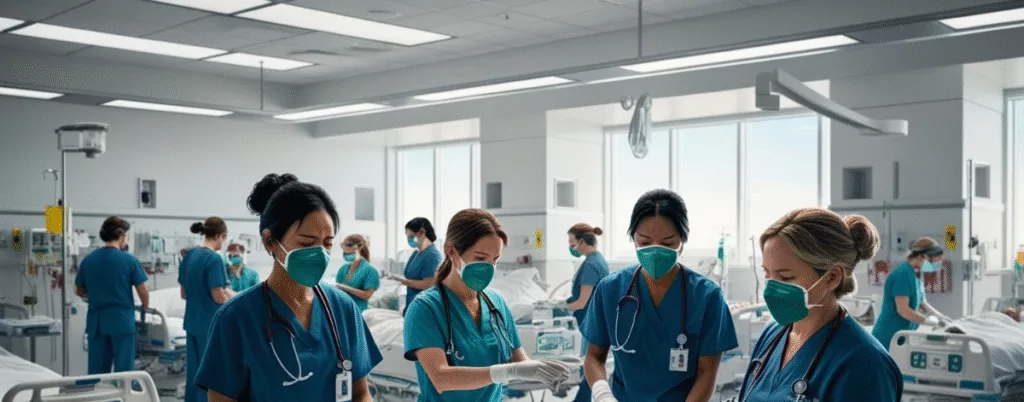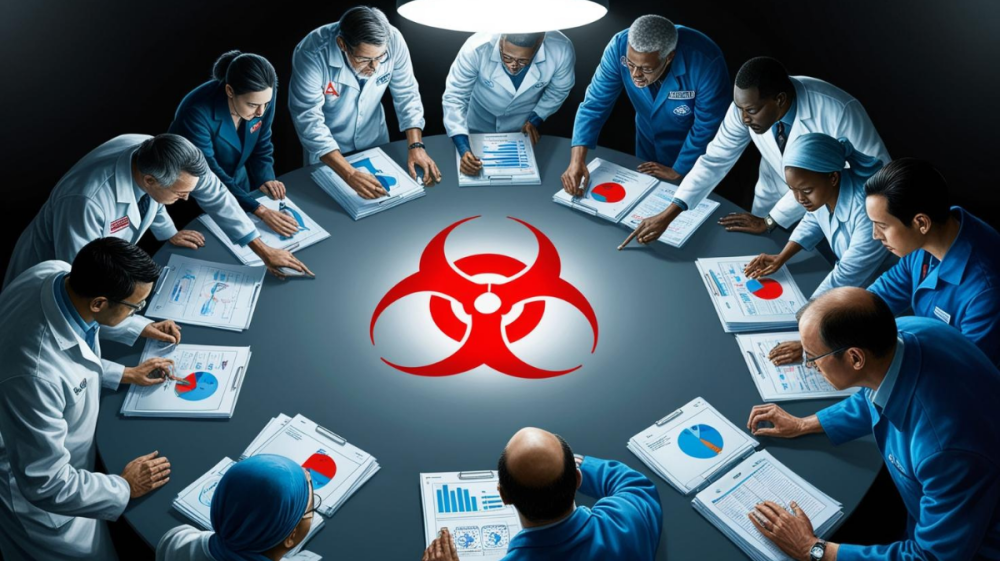Table of Contents

Biological emergencies, whether natural or man-made, represent significant threats to global health and safety. These emergencies can originate from various sources, including viruses, bacteria, or other microorganisms that pose a risk to human life. The distinction between natural and man-made threats is important. Natural threats could be pandemics like the flu, while man-made threats often involve the intentional release of harmful biological agents.
To read more on types of Biological Threats Read Here.
The global impact of pandemics and outbreaks is far-reaching. We’ve seen firsthand how these events disrupt not just healthcare systems but entire societies. The economic implications are profound, affecting everything from local businesses to international trade. This is why readiness and response are crucial components of any healthcare system. It’s not just about reacting when a crisis hits but about being proactive and well-prepared.
A glance at history provides valuable lessons often overlooked. Past biological emergencies, like the Spanish flu or more recent ones like the Ebola outbreak, highlight the importance of robust healthcare infrastructure and international cooperation. These events remind us of the impact well-coordinated actions or missteps can have during such critical times.
In understanding these emergencies, there’s a clear need for healthcare readiness across all levels—from government bodies down to individual healthcare workers. Each level plays a vital role, ensuring systems are in place to effectively manage and mitigate the consequences of these biological threats.
The Vital Role of Healthcare Workers

Healthcare workers are the backbone during biological emergencies. As the frontline defense, their role extends beyond treatment and care to include the rapid assessment and containment of an outbreak. These professionals are often the first point of contact for patients, meaning their skills and knowledge directly influence the pace and effectiveness of the entire response effort.
Managing healthcare facilities under the pressure of an expanding crisis is no small feat. These workers must maintain operational efficiency while safeguarding their own health and that of their colleagues. It’s not just about providing care but also ensuring that the facilities remain safe for everyone involved.
The stress and emotional toll on healthcare workers in these situations can’t be overstated. They have to handle intense workloads and make critical decisions under pressure while keeping their morale high. Emotional resilience and coping strategies become as important as clinical skills.
Training and continuous education are essential to equip healthcare workers with the latest knowledge and techniques necessary during such emergencies. Regular drills and updated protocols ensure that they’re ready to handle unexpected challenges at a moment’s notice.
Healthcare workers are central figures in the coordination of resources and logistics required during a biological emergency. Their insight into the practical limitations and on-ground realities is vital, often informing policy decisions and allowing for more tailored and effective responses.
Challenges Faced by Healthcare Workers

Resource limitations often top the list of challenges during biological emergencies. Healthcare workers trying to secure enough supplies like PPE, medications, and other critical resources can feel like constantly running uphill. Improvisation and resourcefulness become key skills during these times, often requiring workers to stretch supplies farther than ever imagined.
The mental and physical demands placed on these workers are extreme. Long shifts, emotional strain, and the fear of infection can lead to burnout. Addressing mental health is crucial, ensuring there are systems in place to support workers emotionally as well as physically. Offering access to counseling and support groups can make a real difference.
Communication barriers can arise in the heat of a crisis. Whether it’s relaying information between departments or communicating effectively with the public, clear and concise communication is vital. This ensures everyone is on the same page and that misinformation doesn’t sway public perception or response.
Ethical dilemmas frequently accompany these emergencies, requiring healthcare workers to make tough calls—sometimes deciding who receives limited resources first. These decisions can be incredibly tough on anyone, requiring sound judgment and a peer support system to help navigate the complex moral landscape.
All these challenges highlight the need for robust support systems for healthcare workers, ensuring they have the resources, training, and emotional help they need to carry out their critical roles effectively.
Enhancing Preparedness and Future Prospects

Innovations in medical technology are reshaping how we respond to biological emergencies. Advanced diagnostic tools, improved PPE, and novel treatment methods offer new ways to effectively combat outbreaks. Keeping abreast of these advancements ensures healthcare systems are well-prepared and agile.

International collaboration is crucial for managing biological threats. When countries share information and resources, it allows for quicker, more coordinated responses. This global network of communication can significantly reduce the impact of biological emergencies, minimizing both human and economic costs.
Policy developments play a pivotal role in preparedness. Clear guidelines and strategic frameworks provide the structure necessary for swift action during emergencies. Regularly updating these policies ensures they are relevant and reflect the latest scientific knowledge and best practices, improving overall readiness.
Building a resilient community ,( See Article Bracing for Impact), and fostering public trust are essential. Educating the public about the importance of emergency preparedness and the role each person plays can strengthen the overall response. Trust in healthcare systems increases when communities feel informed and see transparent communication during crises.
The road ahead involves adapting and learning from past experiences. By focusing on innovation, collaboration, and communication, healthcare systems can enhance their ability to respond to future biological emergencies with greater efficacy and confidence.
